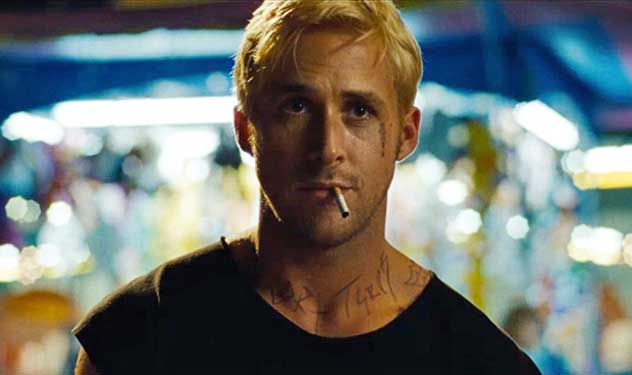The Place Behind The Pines – David Cianfrance. Tatty Tats and dumb drama

![]()
The Place Behind The Pines – David Cianfrance
The paradoxes of cool. If you think you are – you aren’t. If you try to be – you won’t be. Worst of all: if everyone tells you are and you believe them – you never could or will be. Cool is impossible to define: partly because it is culturally relative and changes with time and context.
Ryan Gosling, for me, isn’t cool for most of the reasons above. Not only is he, in recent movies, especially Drive and The Ides of March, directed to be cool; but he tries so hard to live up to this image that his, over-praised performance here is for me arch, and frankly a bit ‘posey’. Gosling’s ‘cool’ is all style – no substance. His motor-cycling, free-wheeling Luke seems laconic more because he’s pretty thick and has nothing interesting to say than self-contained with an inner strength that needs no one else to sustain it. There simply isn’t anything going on behind the eyes: even less than ‘Driver’ in his other ‘Mr Cool movie’ – Drive. Poor old Ryan isn’t much helped by the conceit of the assumption that his sheer magnetism can overcome risible tattoos and at one point what look like a pair of remaindered M&S JimJams.
Does it matter? Who cares if he’s ‘cool’ or not? All a bit esoteric isn’t it? Well no I’m afraid. All the publicity and the whole tone and feel of the movie, is trying so hard to be stylish and detached; resonant and atmospheric, that when it fails in that – there is nothing of substance left to lean on. Sparse, elliptical dialogue has become a self-indulgent aesthetic cliché of modern Hollywood thrillers. This has one of two equally damaging possible consequences – either the plot is totally incomprehensible like say A Good Day to Die Hard or the execrable Paperboy; or as here, the characters remain flat, uninteresting and unconvincing.
Luke is a County Fair wall-of-death cage-rider. When his passing-through, once-a-year, one-night-stand Romina’s (Eva Mendes) mother tells him that Romina’s son Jason, is Luke’s, our much-tattooed anti-hero gets all paternal in a grotesque misunderstanding of what fatherhood might demand of him. First he beats the sh*t out of the good guy who is looking after Romina and Jason for the other 364 days of the year. Then the need to provide for his son and annual lay inspires him to rob banks with an equally dimwit pal using a methodology as dumb as it is simple. Roll up on his motorbike, park it near the door, jump up on a counter shouting a lot (in an oddly unconvincing squeaky voice by the way) and waving a gun, then pick up the bike and zip off to disappear into the back of a truck super-brain 2 has parked nearby.
With no planning, no variation, and surprise up the Swanee after the first couple of times, this monumentally stupid strategy inevitably ends up in him getting caught and trapped by Bradley Cooper’s ambitious beat cop Avery. Cianfrance’s tilt at tragedy here collapses under its own banality.
In the shoot out Avery’s injury makes him a hero which his corrupt fellow officers, led by Deluca (Ray Liotta) turn to their advantage, sucking him in to their felonious ways.
Then in a much-discussed chronological jump-cut we revisit the narrative 15 years later. Avery is now a local DA and running for Attorney General with an estranged wife (Rose Byrne) and obnoxious teenage son AJ (Emory Cohen). Going for an almost Shakespearean ironic fatalism, Cianfrance’s narrative simply rests on a startling coincidence that would make even our illustrious Bard embarrassed. In a sins-of-the-father denouement Cianfrance, like many current Hollywood directors tries to use image, style and tone to substitute for believable characterisation and narrative conviction.
This is where the issue of cool comes in. Steve McQueen once remarked that a man should feel as much as possible and show as little as possible. Whatever one thinks of this as real-life advice; it certainly evokes the existential detachment and impregnable self-assurance and confidence of ‘cool’. Like that other irreducibly self-consciously cool current actor Denzel Washington; Gosling’s fails because he is using tropes and mannerisms looking 10-20 years out of date. A bit of Newman here; a touch of Eastwood there; and God help us, a little touch of Ryan O’Neal (who never was cool anyway), doesn’t play in 2013. Much of the fault here lies with Cianfrance: Emory Cohen’s youthful sub-Brando AJ is embarrassing and the ludicrous druggy argot he shares with the much better Jason (Dane Dehaan), just sounds like it exists solely on planet Hollywood.
These are people we don’t really believe in enough to care about; placed in interesting but palpably contrived circumstances; whose fate is supposed to evoke a sense of tragedy and inescapable destiny that their shallow characterisation cannot remotely sustain.
As ever nowadays in Hollywood – the technical skills of cinematography, powerful editing, evocative soundtrack etc offer much to admire: but equally predictable, the sheer superficiality of writing and concentration on the gloss of style and tone, cool if you will – proves to be an inadequate substitute for genuine substance and characterisation.
Very disappointing.
If you want to see the timelessness of cinematic cool and charismatic performance in a thriller setting, catch up with the re-release of John Boorman’s Point Blank. Nearly 40 years old but still powerful and evocative.
Now that is cool.
Filed under: David Cianfrance, Uncategorized

